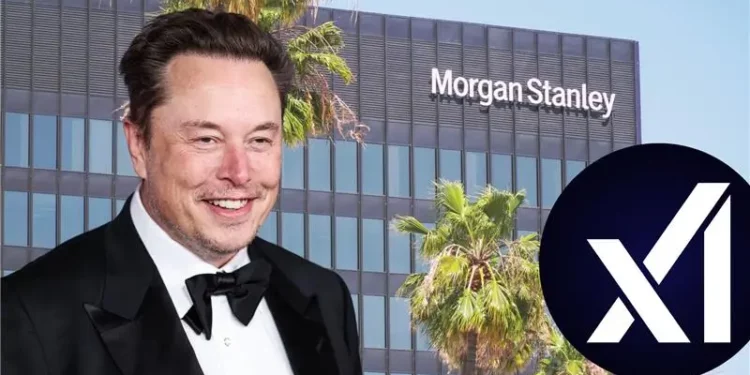Elon Musk has been one of the biggest flagbearers of advancing AI capabilities, and to that end, Morgan Stanley is marketing a $5 billion package of bonds and two loans on behalf of Musk’s xAI.
Artificial intelligence (AI) is long past the point of being the ‘next-big-thing.’ AI is already the biggest thing, and the technology sector is already intrinsically linked with all other sectors, particularly in the world of business. Elon Musk has been one of the biggest flagbearers of advancing AI capabilities, and to that end, Morgan Stanley is marketing a $5 billion package of bonds and two loans on behalf of Musk’s xAI.
This flotation comes at the same time as the public feud between the world’s richest man and US President Donald Trump. Reuters reported that Morgan Stanley has been discussing a floating-rate term loan B at 97 cents on the dollar with 700 basis points (bps) as the variable interest rate over the SOFR benchmark rate.
The bank is also offering a loan and bonds at a fixed rate of 12% as an alternative. The terms are still in the preliminary stage and may be altered depending on investor demand. Morgan Stanley met with investors last week, and sources confirmed that the company’s finances were shared and discussed. These insider sources also confirmed to Reuters that the company would employ a different approach to market the $5 billion debt for xAi from previous transactions.
Morgan Stanley will neither guarantee the issue volume nor commit its own capital to the deal. Given the uncertain economic conditions and rising geopolitical tensions worldwide, banks are exercising caution in lending. Therefore, the company’s decision to opt for a ’best efforts’ transaction is not uncommon. A best efforts transaction is one where the size of the debt will depend on investor interest, and signals that banks are more restrained in lending in such a macro environment.
Elon Musk’s history with finance groups has not always been smooth sailing. Although the billionaire has never defaulted on any loans, banks still have reservations about committing themselves to large loans after the precarious situation that erupted from his $44 billion acquisition of social media platform X, formerly known as Twitter.
Morgan Stanley is likely using the best efforts approach to avoid being in the position that banks were in when they committed to lend $13 billion of debt to Musk for the X acquisition and were unable to get out of that position for two years. This deal was considered one of the boldest bets by seven banks and was led by Morgan Stanley.
Usually, once a deal is completed, banks sell these loans to investors, but with X’s acquisition, they were compelled to hold on to it for nearly two years. This was due to low investor confidence as the deal was finalised when the US Federal Reserve began raising interest rates and Musk began restructuring his new company. They were only able to dispose of the loan earlier this year, owing to the platform’s improved operating performance over the previous two quarters, as user traffic grew exponentially before and after the US Presidential elections.
Musk’s growing closeness to Trump and his appointment as head of DOGE by the government boosted investor confidence, who could be seeking influential government connections. This helped the SpaceX owner to not only elicit interest for his $13 billion debt but also doubled investor interest for exposure to AI companies.
xAi is not only looking to sell the debt but is also considering the possibility of raising $20 billion in equity funding. There are speculations that this would raise the company’s valuations up to $120-$200 billion.
Despite these grand plans, the public falling out between Trump and Musk is bound to affect investors. Demand for any money raised for this deal is likely to fall, and investors seeking higher risk premiums on the new debt is also not out of the realm of possibility. However, it is certain that Morgan Stanley not using its own capital is only indicative of a future recession given this unfavourable macroeconomic period.

















